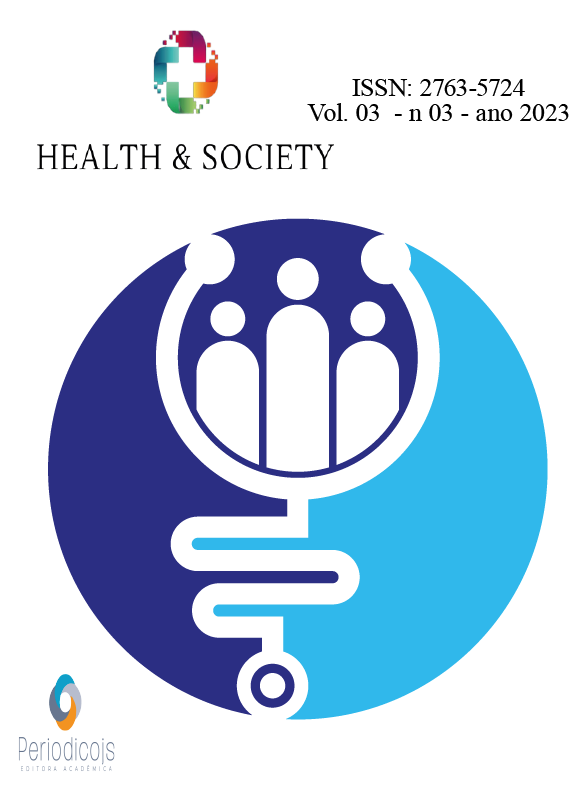Resumo
Depressive disorders are a serious public health problem due to their high prevalence, general health repercussions and psychosocial impact, and are one of the main causes of disability in the world, limiting physical, personal and social functioning. These disorders are caused as a result of failures in the communication of neurotransmitters with the Nervous System, which act in psychomotor activities, appetite, sleep and mood. The treatment applied to patients with depression usually combines psychotherapy and pharmacological therapy, however, nutritional therapy is not usually an option to be added to traditional treatment yet, but more and more studies have been published that emphasize the possibility of alternative treatments and / or complementary, based on nutrition, thus, the question arises about why nutritional therapy is still little used in the control of depression and associated symptoms and the importance of its execution for an adequate recovery of the health state. The general objective of this work was to understand clearly the impact that nutritional therapy consists of in the control of symptoms of depression, in addition to finding ways to avoid them, as it deals with a disease with a high incidence today, especially during the course of the disease. pandemic, depression is a topic that must be treated in detail, clearly and concisely pointing out its common symptoms and effective ways to control them. The present study is a project for a narrative review to be developed in the Course Completion Work, carried out from January to December 2022, through a systematic literature review about the influence of nutrition science in the treatment and control of the disorder depressive.
Referências
Alam, R., Abdolmaleky, H. M. & Zhou, J. Microbiome, inflammation, epigenetic alterations, and mental diseases. American Journal of Medical Genetics Part B: Neuropsychiatric Genetics, 174(6), 651 – 660, 2017. Disponível em: https://pubmed.ncbi.nlm.nih.gov/28691768/ Acesso em 17 de outubro de 2022.
American Psychiatric Association. DSM-5: Manual Diagnóstico e Estatístico de Transtornos Mentais. Porto Alegre: Artmed; 2014.
ARAÚJO, A. S. F.; VIEIRA, I. N. U.; SILVA, J. N. F.; FARIA, S. P.; NUNES, G. L.; KHOURI, A. G.; SOUZA, A. P. S.; MORAIS, M. C.; SILVEIRA, A. A. Avaliação do consumo alimentar em pacientes com diagnóstico de depressão e/ou ansiedade. Revista Referencias em Saúde da Faculdade Estácio de Sá de Goiás – RRS-FESGO. Goiás. Vol.03, n.1, pp. 18-26, jan./jul. 2020.
BARBOSA, Barbara. Terapia Nutricional na Depressão – Como nutrir a saúde mental: uma revisão bibliográfica. Brazilian Journal of Development. Vol. 6, nº 12. 2020.
BERNARDI, M. D. L. MARTINS, J. V. C. P. TREVIZAN. A. R. VEDOVATO, K. ZANONI, J. M. ZUCOLOTO, C. N. O EIXO INTESTINO-CÉREBRO E O PAPEL DA SEROTONINA. Arq. Ciênc. Saúde Unipar, Umuarama, v. 18 n. 1, p. 33-42, jan./abr. 2014.
Bon, A. F.; Tavares, A. L.; Gotifried, C.; Coelho-Aguiar, J. M.; Sanae, M. M.; Soletti, S.; Moura, N. Sistema nervoso entérico. São Paulo: Edgard Blucher, 2016.
BRASIL. Organização Pan-Americana de Saúde (OPAS). Aumenta o número de pessoas com depressão no mundo. Brasília, DF, 2017.
CARA, D. V. C., CARDOSO, H. C. S.,NAHAS, P. C., SILVA, L. A. A importância da alimentação adequada na depressão. Centro Universitário UNA. Goiás, Brasil, 2018.
DOMINGUEZ, N. L. PORTO, E. B. S. A DEPRESSÃO E SUA RELAÇÃO COM OS NUTRIENTES. CENTRO UNIVERSITÁRIO DE BRASÍLIA – UniCEUB FACULDADE DE CIÊNCIAS DA EDUCAÇÃO E SAÚDE. Brasília, 2016.
GONÇALVES, et. Al. Prevalência de depressão e fatores associados em mulheres atendidas pela Estratégia de Saúde da Família. J Bras Psiquiatr. 2018;67(2):101-9. Rio de Janeiro, Brasil. 2018.
LAKHAN, S. E.; VIEIRA, K. F. Nutritional therapies for mental disorders. Nutr. Journal, Los Angeles, v.7, n.2, jan. 2008.
LELIS, Karen de Cássia Gomes et al. Sintomas de depressão, ansiedade e uso de medicamentos em universitários. Revista Portuguesa de Enfermagem de Saúde Mental, Porto, n. 23, p. 9-14, jun. 2020.
BRASIL, Ministério da Saúde; IBGE; Ministério do Planejamento, Orçamento e Gestão. Pesquisa Nacional de Saúde, 2013. Disponível em: <ftp://ftp.ibge.gov.br/PNS/2013/pns2013.pdf>. Acesso: 06 de setembro de 2022.
MOHAMMAD-ZADEH, L. F.; MOSES, L.; GWALTNEY- BRANT, S. M. Serotonin: a review. J. Vet. Pharmacol. Ther. v. 31, n. 3, p. 187-99, 2013.
MORITZ, B.; MANOSSO, L. Nutrição Clínica Funcional - Neurologia. São Paulo: VP, 2013.
NASCIMENTO, L. C.; SALVI, J. O. Ansiedade, depressão e Medicamentos Psicotrópicos em Idosos Institucionalizados Município de Ji-Paraná, Rondônia, 2018.
ORGANIZAÇAO MUNDIAL DE SAÚDE. Relatório sobre a saúde no mundo 2001: Saúde mental: nova concepção, nova esperança. Genebra, 2001.
PIMENTEL, C. Nutrientes importantes para o tratamento da depressão: você sabe quais são?. Disponível em: <https://www.carolinapimentel.com.br/nutrientes-importantes-para- otratamento-da-depressao-voce-sabe-quais-sao/>. Acesso: 07 de setembro de 2022.
SANTANA, S. A. SOUZA, M. F. C. Uso do ômega-3 na depressão. Universidade Católica de Brasília. Brasília, 2013.
SEZINI, Angela Maria; GIL, Carolina Swinwerd Guimarães do Coutto. Nutrientes e depressão. Vita et Sanitas, Trindade, GO, n. 08, Jan-dez./2014.
Tolkien, K., Bradburn, S., & Murgatroyd, C. Na anti-inflammatory diet as a potential Intervention for depressive disorders: A systematic review and metaanalysis. Clinical Nutrition. Escócia, 2019.
WORLD HEALTH ORGANIZATION. Depression, 2016. Disponível em: <http://www.who.int/mediacentre/factsheets/fs369/en>. Acesso: 06 de setembro de 2022.
Zorzo, R. A. Impacto do microbioma intestinal no Eixo Cérebro-Intestino. International Journal of Nutrology, 10(1), 298S – 305S. Março, 2017. Disponível em: http://dx.doi.org/10.1055/s-0040-1705652 Acesso em: 19 de outubro de 2022.

Este trabalho está licenciado sob uma licença Creative Commons Attribution 4.0 International License.
Copyright (c) 2023 Letícia Kelly de Jesus Cordeiro Oliveira, Luiz Cláudio Gagliardo





